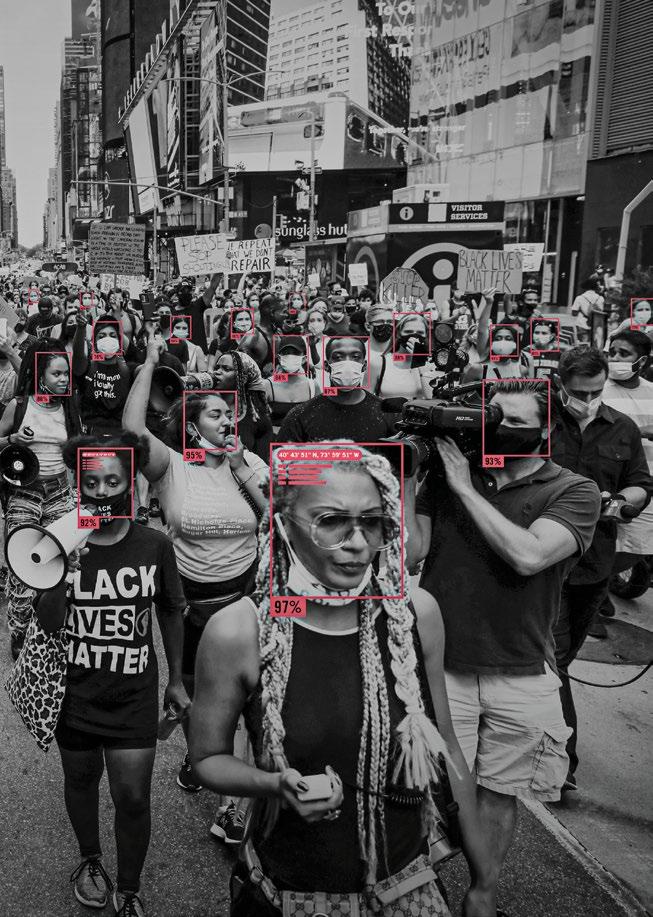
10 minute read
The Ethical Challenge of Artificial Intelligence
The Ethical Challenge of Artificial Intelligence
Technologies allow us to continuously improve our lives, but must be examined carefully, fully understood and regulated very meticulously.
BY GIUSEPPE CORASANITI — PROFESSOR OF PHILOSOPHY OF DIGITAL LAW, UNIVERSITAS MERCATORUM - ROME
“The power of [our] intelligence stems from our vast diversity, not from any single, perfect principle”, stated Marvin Minsky, one of the pioneers of artificial intelligence, in his 1988 essay The Society of Mind. In practice, diversity and the ability to grasp complexity are what give intelligence its true significance. The power of intelligence - any intelligence – lies not in a single principle or a perfect algorithm, but in the ability to understand and address a wide range of situations and problems in a flexible and adaptable manner. Intelligence is therefore not a rigid or exclusive quality but a complex network of cognitive abilities, such as reasoning, learning, memory, and creativity. It shows itself differently in different individuals and can thus be used and developed in various contexts. Furthermore, diversity is often a source of innovation and adaptation as well as of cultural enrichment.
Minsky seems to suggest that the search for a unique solution or a perfect rule may be limiting, whereas the ability to deal with the world's complexity in a flexible and creative manner is what makes intelligence truly powerful. His statement prompts reflection on human action in relation to digital intelligent systems; as a consequence, reflecting on the ability to overcome difficulties and obstacles becomes more interesting, when tackling artificial intelligence, than just using indiscriminately AI across all sectors. It is clear that the topic of artificial intelligence (or artificial intelligences, depending on the contents and functions of AI applications) raises a number of highly controversial issues at international level.
Some fear not keeping up with innovation, while others fear for their future prospects
All sectors, including politics, the economy, services, commercial distribution, education, communications, public administration, justice and weapons manufacturing, demonstrate constant awareness and concern. There are two main anxieties: the fear of not keeping up with innovation and concern about future prospects.
Science fiction films of the 1950s and the emergence of AI, the latter now much cheaper and faster due to more powerful computers and interaction with online resources, initially led to fear of robots. It then became clear that they simplified the lives of workers, such as the car assembly line personnel, whose jobs might carry a risk of occupational disease or injury. In the same way, artificial intelligence is sure to play an extraordinary role in diagnosis and the organisation of care in healthcare facilities, where logistics or a disinclination to share data of common interest often cause problems.
Pope Francis foresees protection coming from "algor-ethics"guarantee criteria already embedded in technology in the development stage
Technologies allow us to constantly improve our lives, but they must be monitored, understood and regulated with great care and sensitivity through civil and democratic measures that only the United Nations can provide at a global level. All countries are moving to define more or less stringent rules, and above all prescribing governance that in essence subjects every automatic innovation based on the logical sharing of data to "political" checks, the traditional means of subjecting the technique to rigid rules that sometimes risk acting as a brake. This is particularly true in a universal context of fierce competition and rapid obsolescence of available technological resources.
After consulting the main companies (all American) involved in AI research, the US President, Joe Biden, recently stated that: "Artificial intelligence promises an enormous promise of both risk to our society and our economy and our national security, but also incredible opportunities". In the American context of extensive public/private cooperation, the predominant artificial intelligence platforms will be able to support science in a number of significant challenges, especially in healthcare. In fact, the President observed that more technological changes are expected in the next 10 years than were seen in the last 50, and that artificial intelligence will be able to transform the lives of people throughout the world.
Pope Francis has also spoken on the topic, underlining how the digital age can change the very perception of space, time and the body, while "homologation is establishing itself as the prevailing criterion of aggregation" and "recognising and appreciating difference is becoming ever harder". Existential and economic repercussions are a threat, with users reduced to the role of "consumers" who are subservient to private interests concentrated in the hands of a few, with a direct effect on democratic processes and civil society in which individuals or groups find favour or face prejudice.
The risks of marginalisation are linked to the possession of information that can lead to discrimination against disadvantaged individuals or social groups who may lack adequate information and guarantees of defence. In this regard, Pope Francis foresees protection coming from "algor-ethics", in which criteria for guaranteed security and non-discrimination are pre-defined for technology in the design and development stage, accompanied by identification of important objectives of common interest, such as dignity of the person, justice, subsidiarity and solidarity. The concept of digital algorithm ethics, or algor-ethics, thus refers to the study and practice of moral principles that guide the development and use of algorithms in artificial intelligence applications.
Algorithms are sequences of instructions that allow machines to process data consistently, recognising and making use of specific information patterns that recur in the data, and to then carry out "conscious" actions automatically and efficiently. "Algor-ethics", therefore, would become a bridge between humans and global digital automatic systems, capable of "ensuring that principles are firmly embedded in digital technologies, through an effective transdisciplinary dialogue".
However, there are numerous technical difficulties in defining digital ethics for algorithms given their intrinsic complexity and the diverse contexts and situations in which they operate. The main problems arise around the transparency of algorithms, which often operate in a way that is unclear to users, regulators and even expert programmers. This also makes it difficult to assess their actual functioning, their true purposes, the critical issues that may emerge long after their introduction, and the potential consequences, all of which implies a need for tools of explanation, documentation and verification.

All algorithms can influence important decisions that concern people's rights and interests, such as access to credit, health, education or justice – as well as life or even survival. This poses the problem of establishing in advance who is responsible for errors, damages or violations associated with the data collected or the methods used to collect it, and of defining adequate appeal, reparation and sanction mechanisms, plus possible forms of timely mediation through dialogue between potentially interested parties. Every algorithm, like every calculation, can reproduce or amplify the inequalities and discrimination already present in civil society or produced by the selection or processing of data. This implies a need for the definition of transparent criteria of justice, inclusion and diversity in algorithm design and in the selection and analysis of data, in order to prevent or remedy bias caused by a mechanical or simplified approach, and the consequent distortions. The European Regulation on Artificial Intelligence (AI) is an initial proposal for legislation that aims to establish a harmonised legal framework for the development, introduction and use of AI in the European Union. The first essential in every sector is to protect the EU's fundamental values and rights, such as human dignity, non-discrimination, individual privacy and data protection, on the model of the already existing GDPR (General Data Protection Regulation, in force since 2016). An ethical approach to AI is critical in the design, development and use of data and algorithms, to maximise sustainable value creation and minimise risks to individuals and society.
The technical difficulties in defining digital ethics arise from the complexity of algorithms and the diversity of contexts
In his Ethics, Baruch Spinoza stated that “we know with certainty that nothing is good or bad except what helps us to understand, or what may prevent us from understanding.” We must therefore acknowledge that nothing can really be assessed negatively or positively without first evaluating it in terms of its impact on human understanding. In Spinoza's view, every cognitive element either helps us to better understand the world or does not hinder or influence full understanding, while every prejudice eventually leads us away from full understanding or in directions that distance us from knowledge.
From a modern rationalist perspective, knowledge and understanding are central and co-existing values, and everything should be judged by how it contributes to their achievement and enhancement. However, this raises questions about how to determine and develop objective criteria for evaluating whether something is good or bad, useful or useless, and positive or negative. Knowledge, morality and evaluation of actions and things are a starting point for a wider modern philosophical discussion on the nature of ethics and value in the use of technologies, and in their non-use, or incorrect or hasty use.
The first essential in every sector is to protect the EU’s fundamental values and rights
When we use digital devices, social media, or apps, we can use Spinoza's perspective to determine whether what we are doing is helping or hindering us as we try to understand the world better. In every digital context, we have - and will increasingly have - access to a vast amount of information. In the future development of intelligent technologies we therefore need to consider whether digital products and services can be effective in understanding users' needs and promoting their well-being or whether – even if in the longer term or from a previously overlooked standpoint – they might have possible negative effects on understanding or on society as a whole.
Our daily lives and our way of being free people can help guide more informed choices in the use of technology and the development of digital solutions that aim to improve understanding and well-being in political, economic and social relations. And this is a perspective that transcends the national dimension to become an increasingly qualifying objective of the systematic and cooperative action of supranational bodies, such as the United Nations.











